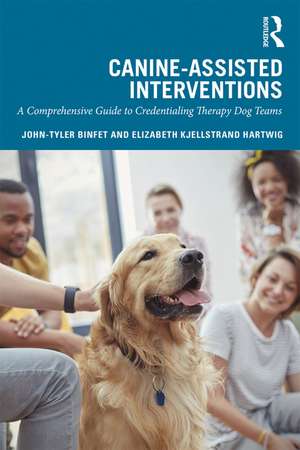Canine-Assisted Interventions: A Comprehensive Guide to Credentialing Therapy Dog Teams
Autor John-Tyler Binfet, Elizabeth Kjellstrand Hartwigen Limba Engleză Paperback – 30 sep 2019
Covering principles of therapy dog team training, assessment, skills, and ongoing monitoring, Canine-Assisted Interventions provides guidance on the most evidence-based methods for therapy dog team welfare, training, and assessment.
The authors offer a linear approach to understanding all aspects of the screening, assessment, and selection of dog-handler teams by exploring the journey of dog therapy teams from assessment of canines and handlers to the importance of ongoing monitoring, recredentialing, and retirement. In addition to reviewing key findings within the field of human-animal interactions, each chapter emphasizes skills on both the human and dog ends of the leash and makes recommendations for research-informed best practices. To support readers, the book culminates with checklists and training resources to serve as a quick reference for readers.
This book will be of great interest for practitioners, in-service professionals, and researchers in the fields of canine-assisted interventions and counseling.
| Toate formatele și edițiile | Preț | Express |
|---|---|---|
| Paperback (1) | 352.39 lei 6-8 săpt. | |
| Taylor & Francis – 30 sep 2019 | 352.39 lei 6-8 săpt. | |
| Hardback (1) | 970.50 lei 6-8 săpt. | |
| Taylor & Francis – 7 oct 2019 | 970.50 lei 6-8 săpt. |
Preț: 352.39 lei
Preț vechi: 370.93 lei
-5% Nou
67.43€ • 70.41$ • 55.68£
Carte tipărită la comandă
Livrare economică 15-29 aprilie
Specificații
ISBN-10: 1138338311
Pagini: 240
Ilustrații: 14 Tables, black and white; 72 Line drawings, black and white; 34 Halftones, black and white
Dimensiuni: 152 x 229 x 15 mm
Greutate: 1.27 kg
Ediția:1
Editura: Taylor & Francis
Colecția Routledge
Locul publicării:Oxford, United Kingdom
Public țintă
Professional and Professional Practice & DevelopmentCuprins
Notă biografică
Elizabeth Kjellstrand Hartwig, PhD, LPC-S, LMFT, RPT-S, is an associate professor in the Professional Counseling Program at Texas State University. She is the founder and director of the Texas State University Animal-Assisted Counseling Academy (aac-academy.clas.txstate.edu).
Recenzii
"Drawing on a wealth of experience, John-Tyler Binfet and Elizabeth Kjellstrand Hartwig provide a comprehensive review of what is known about canine-assisted interventions (CAIs) and give essential information on best practice and how to credential therapy dog teams, ensuring the wellbeing of the dogs. CAI organizations and those interested in becoming a CAI team must read this book." — Anthony L. Podberscek, editor in chief, Anthrozoös, Australia
"Canine-Assisted Interventions is an essential guide to all those involved in delivering and researching canine-assisted interventions. It provides evidence-based guidelines for professional practice, building upon current international research evidence and professional practice guides. The combination of up-to-date scientific evidence on canine-assisted intervention and professional experience has led to a sourcebook that every practitioner involved in canine-assisted intervention should use. Canine-assisted intervention practice is growing rapidly around the world, and this book provides a much-needed guide to credentialing teams and ensuring our practice benefits our human clients while ensuring the welfare of the dogs we work with." — Jo Williams, professor of applied developmental psychology, University of Edinburgh, UK
"In Canine-Assisted Interventions, John-Tyler Binfet and Elizabeth Kjellstrand Hartwig bring together a groundbreaking, thorough, and detailed guide to the assessment and credentialing of dog and handler teams. This long overdue resource is a much needed and indispensable resource for individuals and organizations engaged in the work of animal-assisted interventions. Binfet and Hartwig articulate a clear and thorough evidence-based approach to animal-assisted intervention that will significantly advance this growing field of research and practice." — James Gillett, associate dean of research, McMaster University, Canada
Descriere
Covering principles of therapy dog team training, assessment, skills, and ongoing monitoring, Canine-Assisted Interventions provides guidance on the most evidence-based methods for therapy dog team welfare, training, and assessment.
The authors offer a linear approach to understanding all aspects of the screening, assessment, and selection of dog-handler teams by exploring the journey of dog therapy teams from assessment of canines and handlers to the importance of ongoing monitoring, recredentialing, and retirement. In addition to reviewing key findings within the field of human-animal interactions, each chapter emphasizes skills on both the human and dog ends of the leash and makes recommendations for research-informed best practices. To support readers, the book culminates with checklists and training resources to serve as a quick reference for readers.
This book will be of great interest for practitioners, in-service professionals, and researchers in the fields of canine-assisted interventions and counseling.
